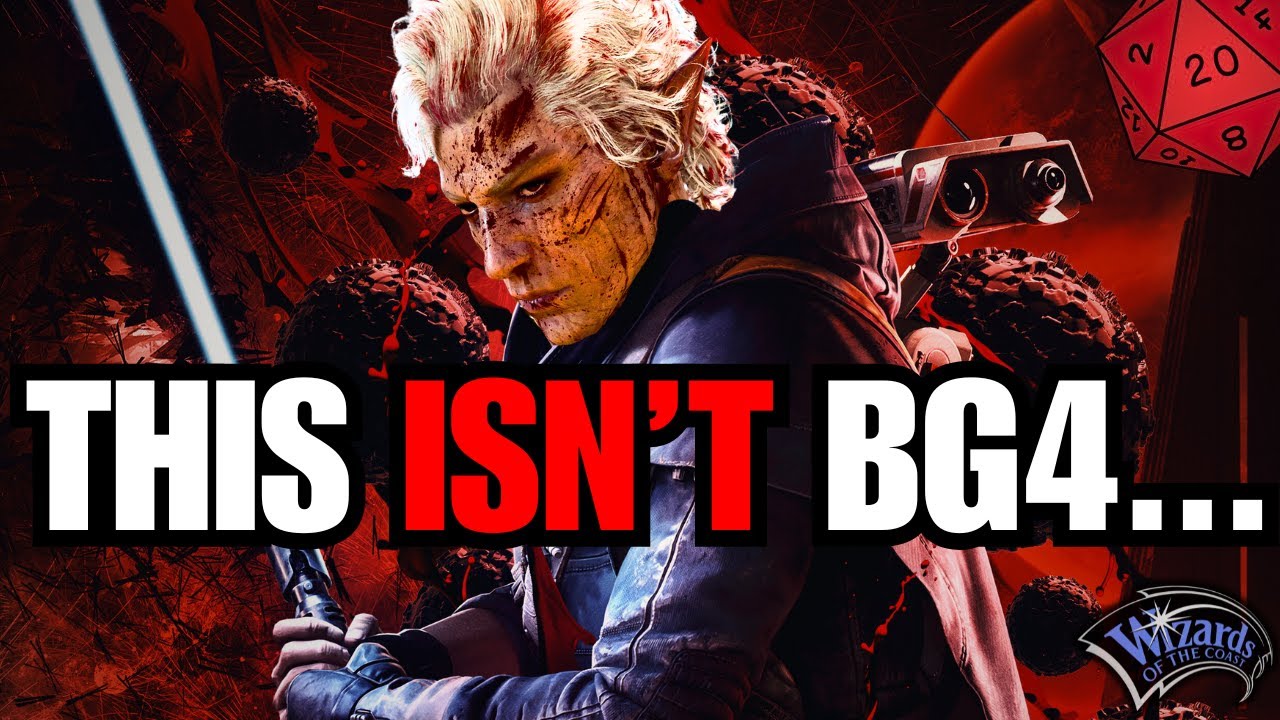The monumental success of Baldur’s Gate 3, developed by Larian Studios and released in August 2023, redefined what a Dungeons & Dragons (D&D) video game could be. With its deep CRPG mechanics, faithful adaptation of D&D 5th Edition rules, and a sprawling narrative, it earned Game of the Year at The Game Awards 2023 and generated $90 million for publisher Hasbro. Fans naturally anticipated a sequel, Baldur’s Gate 4, or at least DLC to expand the story of characters like Shadowheart and Astarion. However, Wizards of the Coast, the custodians of the D&D IP, recently announced their next D&D video game—and it’s not Baldur’s Gate 4. Instead, it’s a single-player action-adventure game, a stark departure from the turn-based CRPG formula. This revelation, shared in early 2025, has sparked heated debate among fans, with some excited for innovation and others frustrated by the pivot. This article explores the new game, its implications for the D&D franchise, and why Wizards is taking this bold risk, drawing on fan sentiment and industry context.

The Announcement: A New Direction for D&D
In June 2025, Wizards of the Coast, a subsidiary of Hasbro, unveiled plans for a new D&D video game described as a single-player action-adventure title. Unlike Baldur’s Gate 3’s isometric, party-based CRPG gameplay, this game emphasizes real-time combat and a linear narrative, set in the Forgotten Realms but distinct from the Baldur’s Gate saga. Details remain scarce, with no developer named, but Eugene Evans, Senior Vice President of Digital Strategy at Hasbro, confirmed the project is part of a broader slate of D&D games planned for release within five years. Evans emphasized the “voracious appetite” for D&D content, citing Baldur’s Gate 3’s success as proof of the IP’s potential in video games.
The announcement came via gaming outlets like The Gamer, which noted the game’s action-adventure focus aims to diversify the D&D portfolio. Unlike Larian’s work, which leaned heavily on D&D 5e’s turn-based mechanics, this title appears to draw inspiration from action-heavy games like God of War or Dragon Age: The Veilguard, prioritizing cinematic storytelling and fluid combat over complex party management. Posts on X captured the mixed sentiment, with one user stating, “An action D&D game sounds dope, but why not give us Baldur’s Gate 4 first?” Another lamented, “Wizards is fumbling the bag after Larian’s masterpiece.”
Why Not Baldur’s Gate 4?
The decision to sideline Baldur’s Gate 4 stems from several factors, starting with Larian Studios’ exit from the D&D universe. In March 2024, Larian’s CEO Swen Vincke announced the studio would not develop DLC, expansions, or Baldur’s Gate 4, choosing to focus on original IPs like a potential Divinity: Original Sin 3. Vincke cited creative freedom and the constraints of D&D’s ruleset as reasons, stating, “We’re not a company that’s made to create DLCs… Life is too short.” This left Wizards without the studio that made Baldur’s Gate 3 a phenomenon, forcing them to seek new partners.
Finding a developer to match Larian’s pedigree is no small task. Wizards is reportedly in talks with multiple studios, but Evans stressed they won’t proceed until they find “the right partner, the right approach, and the right product” for the Baldur’s Gate franchise. The 25-year gap between Baldur’s Gate II (2000) and Baldur’s Gate 3 (2023) underscores Wizards’ cautious approach, as they aim to avoid rushed or subpar sequels. A post on X speculated, “Wizards knows Baldur’s Gate 4 will be compared to BG3. They’re scared of failing to meet that bar.”
Meanwhile, Wizards is diversifying D&D’s gaming portfolio to capitalize on its growing popularity, driven by Baldur’s Gate 3, Critical Role, and shows like Stranger Things. The action-adventure game is part of this strategy, aiming to attract a broader audience beyond CRPG fans. Hasbro’s $90 million windfall from Baldur’s Gate 3 has fueled investment in new projects, with Evans confirming multiple D&D games in development across genres and platforms. This move echoes Wizards’ desire for “different entry points,” including smaller games alongside big-budget titles, to sustain the IP’s momentum.
What We Know About the New Game
While specifics are limited, the new D&D game is a single-player action-adventure set in the Forgotten Realms, likely using the updated D&D 2024 ruleset (a refined version of 5e). Its focus on real-time combat suggests a departure from Baldur’s Gate 3’s turn-based system, potentially resembling the hack-and-slash style of Baldur’s Gate: Dark Alliance (2001) but with modern production values. The linear narrative hints at a more guided story, contrasting with Baldur’s Gate 3’s branching paths and 1.9 million words of dialogue. Previews will be crucial, as fans expecting CRPG depth may be disappointed by a streamlined experience, a risk highlighted by The Gamer’s comparison to Dragon Age: The Veilguard’s mixed reception.
The game’s setting remains unconfirmed, but possibilities include regions like Neverwinter or Waterdeep, both rich with D&D lore. Fan speculation on X suggests it could revisit the Neverwinter Nights series, with one user proposing, “Neverwinter Nights 3 with D&D 2024 rules would be perfect—it’s less pressure than BG4.” Obsidian Entertainment, known for Pillars of Eternity and Neverwinter Nights 2, has been floated as a potential developer, especially if their upcoming RPG Avowed succeeds. The game’s single-player focus aligns with Wizards’ goal of accessible entry points, potentially appealing to players intimidated by Baldur’s Gate 3’s complexity.
Fan Reactions: Excitement and Skepticism
The announcement has divided the D&D community. On one hand, fans of action-adventure games are intrigued by the prospect of a fresh take on the Forgotten Realms. A Reddit thread praised the idea, with a user noting, “A D&D game with God of War vibes could bring in new players who found BG3 too overwhelming.” The success of Baldur’s Gate 3 has given Wizards the freedom to experiment, as its critical and commercial triumph—winning BAFTAs for Best Game, Narrative, and Music—proved D&D’s versatility in gaming.
On the other hand, CRPG purists feel betrayed by the pivot. Baldur’s Gate 3’s 176 hours of cinematics, deep role-playing, and faithful 5e mechanics set a high bar, and many expected Wizards to double down on that formula. An X post captured the frustration: “Why mess with success? BG3 was perfect, and now they’re making something nobody asked for.” Some fear the action-adventure genre risks alienating the core audience, especially if it lacks the depth of Larian’s work. Comparisons to Dragon Age: The Veilguard, which struggled under the weight of its franchise’s RPG legacy, underscore the challenge of meeting fan expectations.
Wizards’ handling of the D&D IP has also drawn scrutiny. A PC Gamer article criticized Hasbro’s “comical fumbling” of Baldur’s Gate 3’s success, pointing to layoffs of the team that collaborated with Larian and the troubled launch of Sigil, a D&D virtual tabletop. These missteps fuel skepticism about Wizards’ ability to deliver a worthy follow-up, with one X user quipping, “Hasbro’s gonna botch this like they botched Sigil.”
Implications for the D&D Franchise
The new game’s success hinges on execution. If it delivers a compelling story and engaging combat, it could expand D&D’s reach, much like Baldur’s Gate 3 attracted new tabletop players. The D&D 2024 ruleset, designed to be backward-compatible with 5e, offers a modern framework for mechanics, potentially integrating streamlined versions of classes like Fighter or Rogue for action-oriented gameplay. A well-crafted action-adventure could also pave the way for diverse D&D games, from mobile titles to AAA epics, fulfilling Wizards’ vision of a multi-genre portfolio.
However, failure could damage the IP’s momentum. Baldur’s Gate 3’s success raised expectations, and a lackluster game risks alienating fans, especially if Baldur’s Gate 4 remains in limbo. Wizards’ cautious approach to the Baldur’s Gate franchise—prioritizing quality over speed—suggests they’re aware of the stakes. Evans’ promise of beloved characters like Shadowheart returning in future projects hints at a long-term plan, but the immediate focus is on proving D&D’s versatility beyond CRPGs.
Why This Matters
The shift to an action-adventure game reflects broader trends in gaming, where publishers seek to balance innovation with fan expectations. Baldur’s Gate 3’s triumph, built on Larian’s Divinity 4.0 engine and meticulous 5e adaptation, was a once-in-a-generation achievement. Replicating it without Larian is daunting, and Wizards’ decision to explore new genres shows both ambition and pragmatism. By avoiding direct competition with Baldur’s Gate 3, they sidestep inevitable comparisons, allowing the new game to stand on its own merits.
For fans, the announcement is a test of loyalty. Those who embraced Baldur’s Gate 3 for its depth may hesitate, but others, drawn to D&D’s lore and world, may welcome a fresh perspective. The Forgotten Realms is vast, and a well-executed action-adventure could spotlight underrepresented regions or stories, much like Neverwinter Nights did in 2002. As Wizards navigates this transition, their ability to listen to fans—while taking calculated risks—will shape D&D’s gaming future.
Conclusion: A Risk Worth Taking?
Wizards of the Coast’s decision to prioritize a D&D action-adventure game over Baldur’s Gate 4 is a bold gamble, driven by Larian’s departure, the need for innovation, and a desire to broaden the IP’s appeal. While it risks alienating CRPG fans, it offers a chance to redefine D&D in gaming, potentially attracting new players with a cinematic, accessible experience. The road ahead is fraught with challenges—finding the right developer, meeting sky-high expectations, and avoiding past missteps—but the potential rewards are immense. As fans await more details, one thing is clear: the legacy of Baldur’s Gate 3 looms large, and Wizards’ next move will determine whether they can capture that magic again, in a new form.





